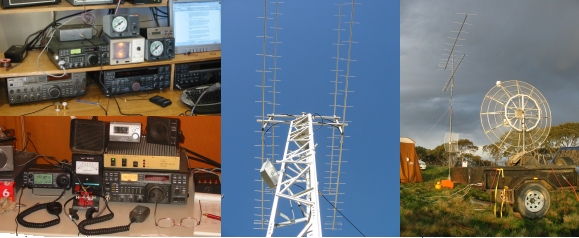Amateur Radio in Australia - VKFAQ
This website provides information about Amateur Radio to help you know what Amateur Radio is, why people get involved in it and some examples of the many varied activities radio amateurs get involved with. It also provides information useful for Australian radio amateurs about where to get more information, national and local amateur radio associations, where to find equipment and how to use it.
Amateur Radio is a hobby for persons interested in radio communications with others using radio technology. But it's more than that too.
You need a government issued licence to transmit on the radio bands. But unlike other licence types, for an amateur licence you need to pass an exam proving you have sufficient understanding of the technology to be allowed that privilege.
Why is it a privilege? What's so special about transmitting on the radio? Isn't that what CB radios do? Why do you need to pass exams? Why is it so complicated?
This website answers those questions and many more.
Who issues amateur radio licences in Australia?
In Australia licences are issued by the Australian Communications and Media Authority (ACMA). Licences are only issued to persons who have passed appropriate exams. More on exams and licence classes later.
Why is it so formal and complicated?
To understand why it is so formal, let's take a quick look at how the government defines Amateur Radio.
The Government view of Amateur radio is this:
"Amateur Radio stations are operated for the purposes of self training in radiocommunications, intercommunication using radiocommunications and technical investigation into radiocommunications by persons who:
- do so solely with a personal aim;
- have no pecuniary interest in the outcome of the operation of the station; and
- are operated on [specified] amateur frequencies or frequency bands..."
This pretty much encapsulates the spirit of amateur radio, and every country which has an amateur service defines the service in similar words.
In other words radio amateurs have a personal interest in the technology, are not permitted to use their amateur licences for business or money-making purposes and must operate within the government regulations, including the frequency bands, modes and power limits set by those regulations.
Why do all countries take this view of Amateur Radio?
The radio spectrum is shared by all countries, so it's important to have agreed frequency allocations for common purposes. Without that level of agreement, all kinds of coordination problems would occur. Any common requirement for radio communications would become problems. eg. aircraft might communicate on a different band in every country, broadcasting stations would be in different bands, and other international services like emergency networks would simply be too hard to operate. There are other services that use the "radio spectrum" too, like Wireless Networking, cellphone technology, satellite links and so on.
The International Telecommunications Union, a part of the United Nations, provides the coordination point for these agreements on frequency allocations. So member countries tend to have similar rules regarding amateur radio, though some of the details are left to each country to decide. Callsign prefixes are specified by the ITU but each country decides how to allocate state codes, how to indicate licence classes with certain letters in the callsign etc. The normal prefix for Australia is VK. Hence this is named the VK FAQ.
Why do amateur radio licences exist at all?
While the most obvious activity in amateur radio is communicating with other radio amateurs in various ways, the central principle of amateur radio is experimentation. Unlike other licences, an amateur licence (other than the Foundation licence) permits the use of home built and modified equipment. While many amateurs simply use their licences to enjoy communicating with others, or to experiment with antennas and propagation, some do build their own equipment, or modify commercial equipment for improvements or new uses. To make sure amateurs understand how to prevent interference with other services (such as aircraft or emergency services or broadcasting) each amateur has to pass an exam on technical issues and the regulations governing amateur licencing.
Next: More about amateur radio and how it is different from other communications services
| g6dpp.com Amateur Radio World Ring Owned by Australian Amateur Radio FAQ [ Previous 5 Sites | Skip Previous | Previous | Next ] [ Skip Next | Next 5 Sites | Random Site | List Sites ] |

